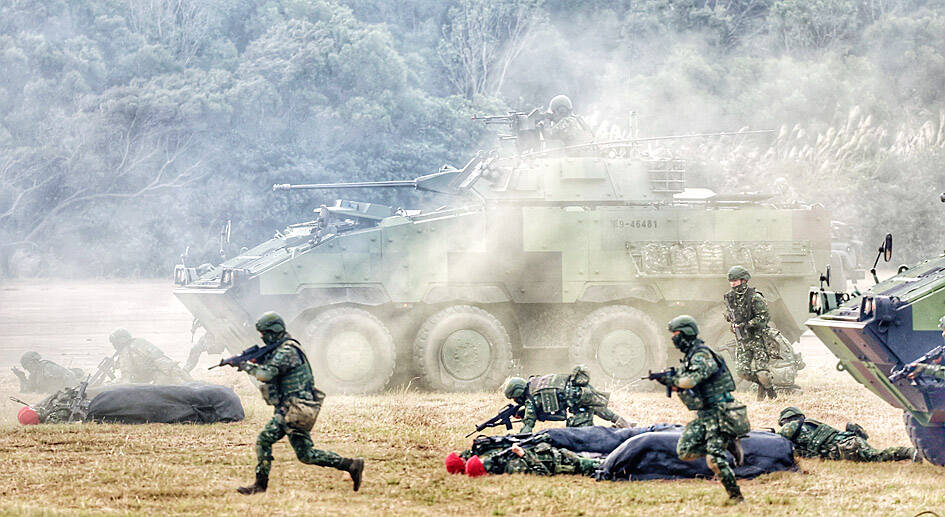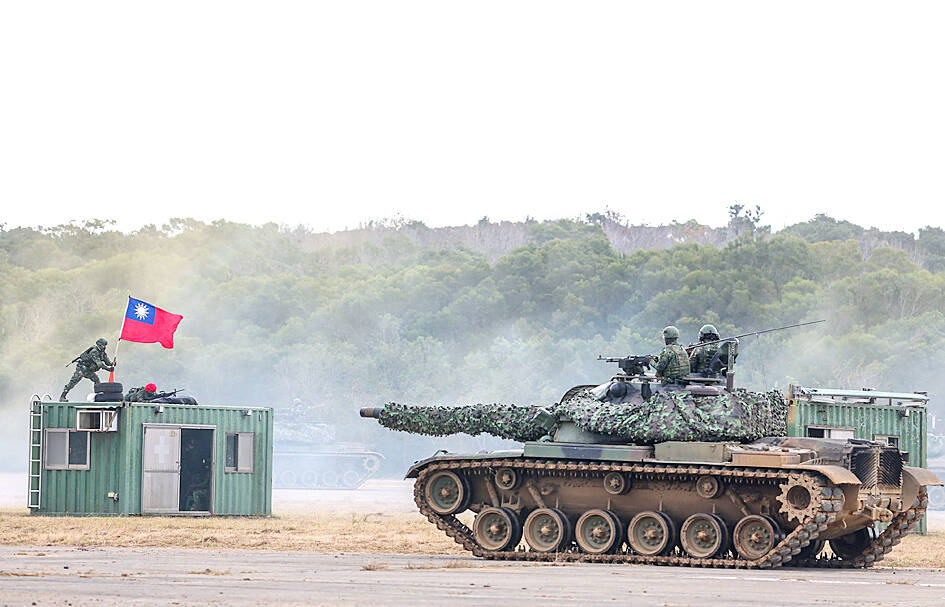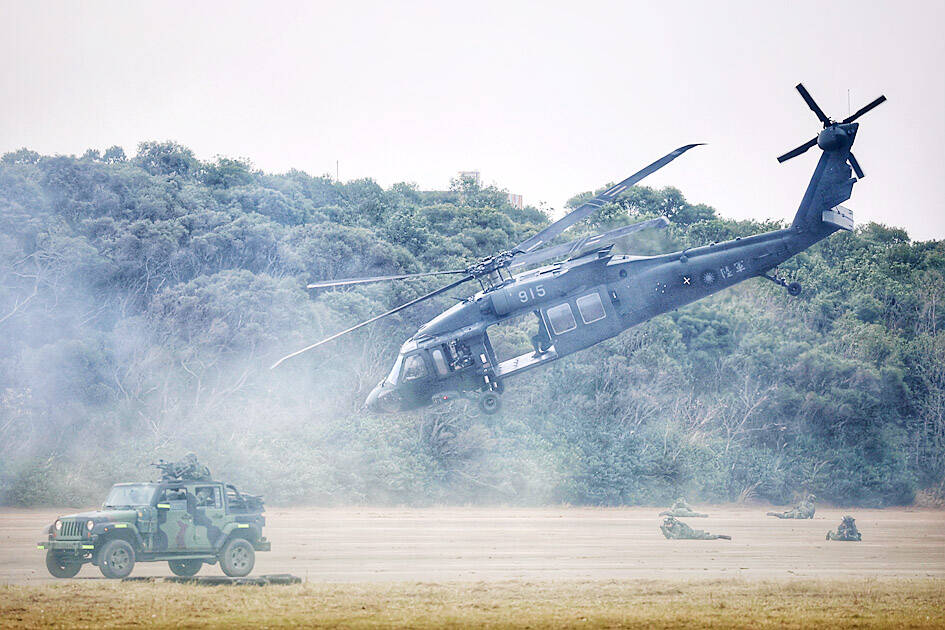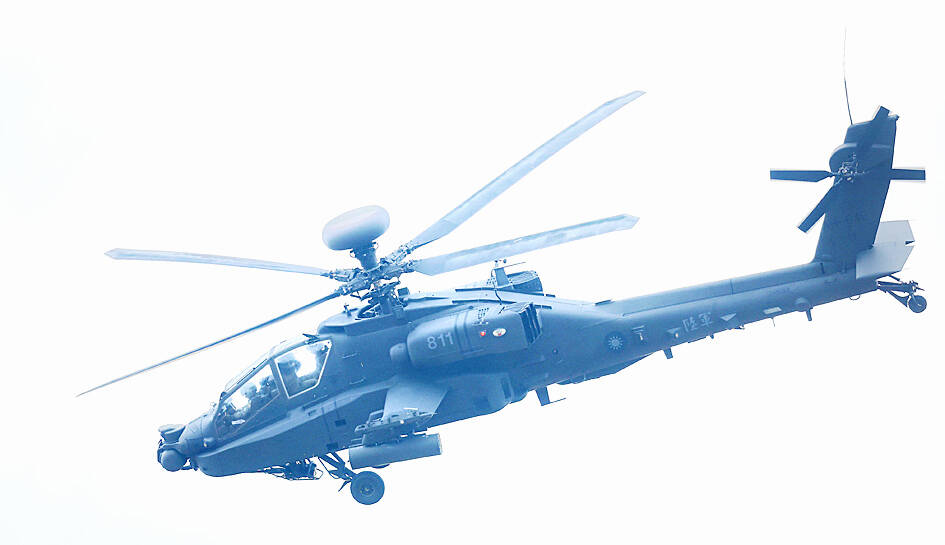The military yesterday began three days of drills as concerns rose over potential cuts to the defense budget due to legislative wrangling.
The drills began in the north with tank maneuvering at a base in Hsinchu County featuring outmoded CM-11 tanks, which are gradually being replaced by newly purchased M1A2T Abrams from the US.
The replacement marks a huge upgrade despite some complaints over the weight of the new vehicles and their likely effectiveness at preventing a possible Chinese landing.

Photo: CNA
Soldiers arrived on armored personnel carriers, while Apache and Sikorsky S-70 helicopters whirled overhead, providing reconnaissance and covering fire.
With the equipment the military currently operates, a communication officer on the ground can coordinate airborne attacks, Army Captain Chuang Yuan-cheng (莊沅澂) said of the 542 Armored Brigade in Hsinchu County.
Today, the army is to show off its Patriot III anti-missile system aimed at countering one of China’s most potent weapons. Tomorrow, anti-submarine exercises are to be held off the Port of Kaohsiung, considered China’s best conduit for resupplying its troops should it establish a beachhead in the heavily defended region.

Photo: I-Hwa Cheng, AFP
The annual drills are held in the run-up to the Lunar New Year holiday to reassure the population of the military’s ability to meet China’s threats and to boost recruitment.
Taiwan has a backlog of orders from the US for about US$20 billion in weapons systems, while it upgrades its F-16 jets and develops its own submarines. It has also extended compulsory military service to one year.
However, the government has warned that new legal amendments being considered could force a 28 percent cut in the defense budget by altering the way funds are distributed between the central and local governments.

Photo: CNA
That in turn could reduce the willingness of the US and its allies such as Japan and the Philippines to assist Taiwan in the event of an armed clash with China, National Security Council Secretary-General Joseph Wu (吳釗燮) told legislators last month.
The legislation is being pushed by the main opposition Chinese Nationalist Party (KMT), which has joined with the Taiwan People’s Party to oppose the ruling Democratic Progressive Party’s legislative agenda.
Taiwan annually spends about 2.4 percent of its GDP, or about US$20 billion, on the military.

Photo: CNA
China has responded furiously to all US arms sales to Taiwan, saying that unification is inevitable and warning that Washington is “playing with fire.”
However, neither military intimidation, economic coercion nor appeals to their common Chinese ancestry seem to be working on Taiwanese, the vast majority of whom favor the current status of de facto independence.

POSITIVE DEVELOPMENT: Japan and the US are expected to hold in-depth discussions on Taiwan-related issues during the meeting next month, Japanese sources said The holding of a Japan-US leaders’ meeting ahead of US President Donald Trump’s visit to China is positive news for Taiwan, former Japan-Taiwan Exchange Association representative Hiroyasu Izumi said yesterday. After the Liberal Democratic Party’s landslide victory in Japan’s House of Representatives election, Japanese Prime Minister Sanae Takaichi is scheduled to visit the US next month, where she is to meet with Trump ahead of the US president’s planned visit to China from March 31 to April 2 for a meeting with Chinese President Xi Jinping (習近平). Japan and the US are expected to hold in-depth discussions on Taiwan-related issues during the

‘LIKE-MINDED PARTNER’: Tako van Popta said it would be inappropriate to delay signing the deal with Taiwan because of China, adding he would promote the issue Canadian senators have stressed Taiwan’s importance for international trade and expressed enthusiasm for ensuring the Taiwan-Canada trade cooperation framework agreement is implemented this year. Representative to Canada Harry Tseng (曾厚仁) in an interview with the Central News Agency (CNA) said he was increasingly uneasy about Ottawa’s delays in signing the agreement, especially as Ottawa has warmed toward Beijing. There are “no negotiations left. Not only [is it] initialed, we have three versions of the text ready: English, French and Mandarin,” Tseng said. “That tells you how close we are to the final signature.” Tseng said that he hoped Canadian Prime Minister Mark Carney

President William Lai (賴清德) yesterday bestowed one of Taiwan’s highest honors on Saint Vincent and the Grenadines (SVG) Ambassador Andrea Clare Bowman in recognition of her contributions to bilateral ties. “By conferring the Order of Brilliant Star with Grand Cordon on Ambassador Bowman today, I want to sincerely thank her, on behalf of the Taiwanese people, for her outstanding contribution to deepening diplomatic ties between Taiwan and SVG,” Lai said at a ceremony held at the Presidential Office in Taipei. He noted that Bowman became SVG’s first ambassador to Taiwan in 2019 and

A man walks past elementary school artworks at the Taipei Lantern Festival in Ximen District yesterday, the first day of the event. The festival is to run from 5pm to 10pm through March 15.